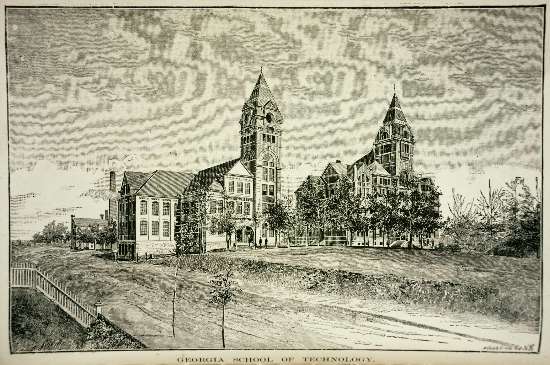 |
gtanno189091-000b
Location:
T171 .G42 G49x 1888-1899
Title: Date:
Georgia School of Technology
1891
Content:
Engraving of the Georgia School of Technology campus ca. 1891 as the frontispiece to the Annual Catalogue of
the Georgia School of Technology, Announcement for 1890-'91.
History:
The Georgia School of Technology was first discussed in 1882 by two confederate veterans--Major J.F.
Hanson, a publisher and manufacturer who later became a railroad president and Nathaniel E. Harris, a
Macon attorney. Harris ran for state legislature with the intent to establish the school and spent the
next three years working for passage of a bill authorizing the school. In the summer of 1885, the bill
finally passed, with the narrowest of margins. In January, 1886, the Governor appointed a committee to
establish the school, and $65,000 was appropriated for grounds, building, tools and appliances. The Peters
Park area was selected over competing tracts in Grant Park and on Boulevard. Nine acres were acquired and
two buildings constructed to form the first campus. Both buildings, completed in 1888, were designed by
the prestigious Atlanta architectural firm of Bruce and Morgan. The Academic Building,was constructed by
contractor Angus McGilvray and cost $43,250 total in state funds. The Shop Building was constructed by the
firm of Petit and DeHaven and cost $20,000 total in state funds. The Academic and Shop buildings were
designed in "High Victorian" style according to the principles of Ruskin. They were built of Chattahoochee
brick, machine pressed brick, and Georgia marble and granite and thus serve as monuments to the "fledgling
industrial South." According to Warren Drury, in his 1984 M.A. Thesis, "The Architectural History of
Georgia Tech," the two buildings "personify in masonry the educational concepts which informed the very
establishment of Georgia Tech, a division of hand and brain which envisioned as of equal importance, the
intellectual and practical pursuits of an educated person." The towers on each building symbolize the two
parts of the educated man. Drury further states that "the justaposition of art and technics can be seen in
the [Academic] Building, which contrasts molded brick ornament with smooth human-made brick and the rugged
artisian granite column capital in the center of the porch with the smooth, shiny machine-finished marble
column."